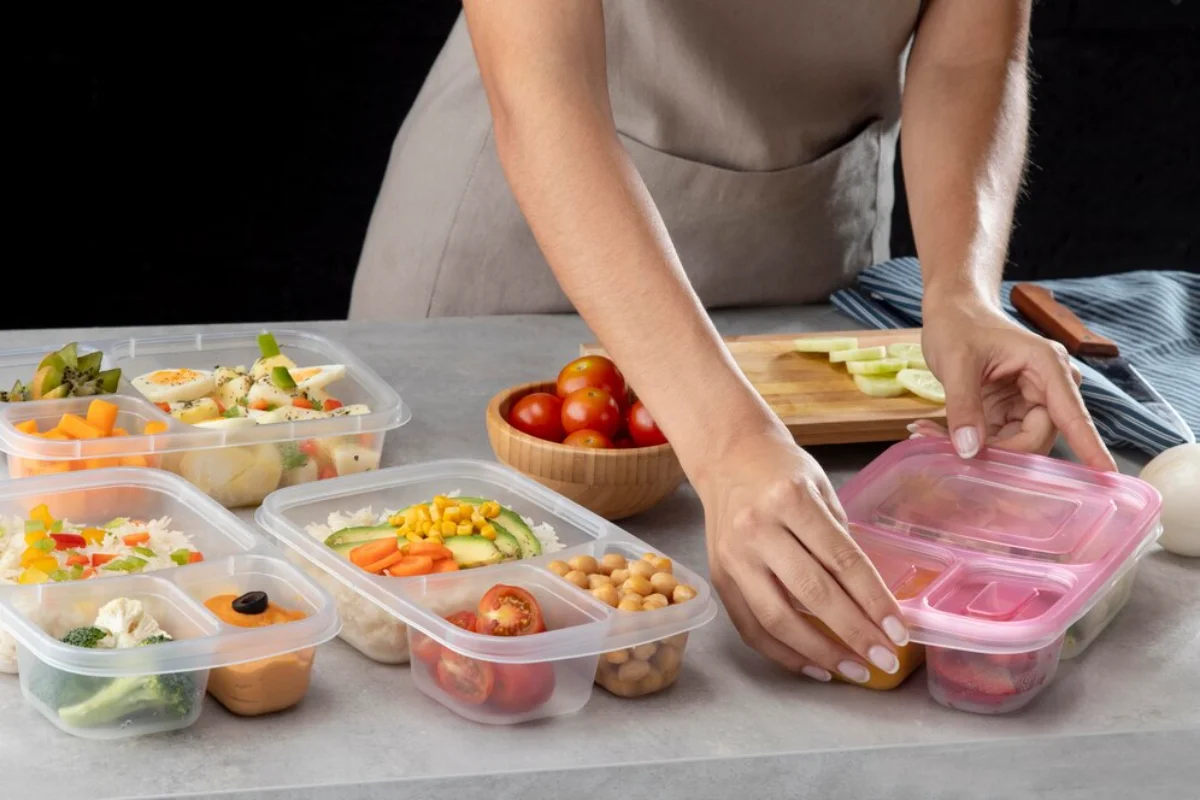
How to Master Meal Prepping for a Healthy Lifestyle
It has become really challenging to maintain a healthy diet in this fast-paced world. Long work hours, household chores, social commitments, etc. , often do not give us time to prepare nutritious meals. This is where meal prepping comes in. Meal prepping enables you to plan, organise, and portion your meals, which helps you ensure that you always have healthy options at hand. It saves time, maintains portion control, reduces stress, and makes healthy faffing a doddle.
Meal prepping is not just a fad; it’s a way of life that allows you to master your nutrition. Meal planning helps you avoid last-minute food decisions that often lead to poor choices. In this article, we’re talking about how meal prepping is essential to your diet, its main benefits and step-by-step instructions on how to start. Follow along through the guide, and by the end, you’ll have everything you need to make meal-prepping an effortless addition to
Pro Tip: Keep your meals exciting by rotating ingredients and trying different cuisines.

Quick Guide: How to Master Meal Prepping for a Healthy Lifestyle
- Plan Your Meals: Choose a variety of balanced meals for the week, including proteins, carbs, and vegetables.
- Create a Shopping List: Organize your list by categories (proteins, grains, veggies) to avoid unnecessary purchases.
- Cook in Batches: Prepare large quantities of ingredients (proteins, grains, veggies) for easy assembly throughout the week.
- Portion Control: Use portioned containers to keep meals balanced and prevent overeating.
- Store and Label: Store meals in airtight containers and label them with dates and contents for easy tracking.
Important: Invest in quality, leak-proof containers to keep your prepped meals fresh.
Key Benefits of Meal Prepping
Why It Matters
Meal prepping is more than convenience—it is the foundation of a healthy, balanced lifestyle. Here’s why incorporating meal prep into your routine is essential:
- Encourages Healthy Eating Habits: Pre-portioned meals reduce the temptation to indulge in unhealthy snacks or takeout.
- Promotes Portion Control: Prepping meals in advance helps regulate portion sizes, preventing overeating.
- Saves Time: Dedicating a few hours a week to meal prepping can save significant time during busy weekdays.
- Reduces Food Waste: Planning meals ahead ensures you buy only what you need, reducing unnecessary waste.
- Saves Money: Home-cooked meals are more cost-effective than frequently eating out or ordering takeout.
- Eliminates Stress: A structured meal plan removes the daily stress of figuring out what to eat.
Real-Life Applications
Consider Sarah, a busy professional who used to rely on fast food because she never had time to cook. By dedicating a few hours on Sundays to meal prepping, she now has healthy meals ready for the week. Not only has this improved her energy levels, but it has also saved her money and reduced stress. Her experience is a testament to the transformative power of meal prepping.
Step-by-Step Guide to Effective Meal Prepping
Step 1: Plan Your Meals
Before cooking, decide what meals you want to prepare for the week. Consider your dietary preferences, nutritional goals, and available time. Aim for a balanced mix of proteins, carbohydrates, and vegetables.
Example Meal Plan:
- Breakfast: Overnight oats with fresh berries and nuts.
- Lunch: Grilled chicken salad with mixed greens and vinaigrette.
- Dinner: Quinoa and vegetable stir-fry with tofu.
- Snacks: Hummus with carrot sticks and apple slices with almond butter.
Step 2: Create a Shopping List
Once you have a meal plan, make a shopping list to ensure you get everything you need. Organise your list by category (proteins, grains, vegetables) to streamline your grocery trip and avoid unnecessary purchases.
Step 3: Cook in Batches
Set aside a designated day to cook meals in batches. Batch cooking allows you to prepare multiple servings simultaneously, making the process more efficient. Roast vegetables, cook proteins, and prepare grains in bulk to assemble meals quickly throughout the week.
Step 4: Portion Control
Divide meals appropriately using portioned containers. This ensures balanced nutrition and prevents overeating. Investing in a food scale can help with precise portioning.
Step 5: Store and Label
Properly store meals in airtight containers. Label each container with the date of preparation and contents to keep track of freshness—store meals in the fridge for short-term consumption and freeze portions for later use.

Additional Expert Tips & Common Mistakes to Avoid
Best Practices for Meal Prepping
- Variety is Key: Prevent meal fatigue by rotating ingredients and trying different cuisines.
- Stay Organized: Keep your kitchen, fridge, and pantry tidy to make meal prep efficient.
- Invest in Quality Containers: Use BPA-free, microwave-safe, and leak-proof containers to preserve meal freshness.
Common Mistakes and How to Avoid Them
- Overcomplicating Recipes: Stick to simple meals that are easy to prepare and store.
- Ignoring Nutritional Balance: Include protein, healthy fats, and carbohydrates in every meal.
- Not Adjusting Portions: Adjust portion sizes based on individual dietary needs.
Advanced Insights & Expert Recommendations
Customising Your Meal Prep
Your meal prep should align with your personal health goals. Here are some tailored approaches:
- For Weight Loss: Focus on nutrient-dense, low-calorie meals with plenty of vegetables.
- For Muscle Gain: Include high-protein foods like chicken, fish, tofu, and legumes.
- For Maintenance: Keep a balanced approach with a mix of macronutrients.
Incorporating Seasonal Ingredients
Using seasonal produce ensures fresh, flavorful meals while being cost-effective. Rotate your ingredients based on what’s available in local markets.
Frequently Asked Questions (FAQs)
1. How long do prepped meals last in the fridge?
Most meals last between 3-5 days in the refrigerator. For more extended storage, freeze meals and reheat as needed.
2. What are the best containers for meal prepping?
Opt for BPA-free, airtight, microwave and dishwasher-safe containers. Glass containers are a great option as they are durable and environmentally friendly.
3. Can I meal prep if I have dietary restrictions?
Absolutely! Meal prepping allows for complete control over ingredients, making accommodating dietary needs such as gluten-free, dairy-free, or vegan diets easier.
4. How do I prevent my prepped meals from getting boring?
To keep meals exciting, vary your recipes, use different seasonings, and experiment with global cuisines. Adding fresh herbs and sauces can also enhance flavours.
5. Can I meal prep snacks as well?
Yes! Prepping healthy snacks like yoghurt parfaits, protein bars, and cut fruits makes it easier to stay on track with your nutrition goals.
6. How do I keep salads fresh for meal prepping?
Store salad greens separately from dressings and toppings to prevent sogginess. Use airtight containers and add moisture-absorbing paper towels to extend freshness.
7. What if I don’t have time to cook in bulk?
Start small! Prep just a few meals or snack options to ease into the process. Slow cookers and pressure cookers can also help save time.

Conclusion: Meal Prepping – The Key to a Healthy Lifestyle
Meal prepping is your secret weapon for maintaining a balanced and nutritious diet. By planning, preparing, and portioning meals in advance, you can eliminate stress, save time, and effortlessly make healthier food choices.
Whether you’re new to meal prepping or a seasoned pro, remember to stay flexible and let your routine evolve. Start with small, manageable steps, and gradually build a meal-prepping habit that suits your lifestyle.
Now is the time to take charge of your nutrition! Start your meal prep journey today and enjoy the benefits of a healthy, stress-free lifestyle. What are your favorite meal-prepping tips? Share them in the comments below!


